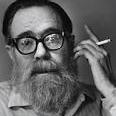Life, friends, is boring. We must not say so.
After all, the sky flashes, the great sea yearns,
we ourselves flash and yearn,
and moreover my mother told me as a boy
(repeatingly) ‘Ever to confess you’re bored
means you have no
Inner Resources.’ I conclude now I have no
inner resources, because I am heavy bored.
Peoples bore me,
literature bores me, especially great literature,
Henry bores me, with his plights & gripes
as bad as achilles,
who loves people and valiant art, which bores me.
And the tranquil hills, & gin, look like a drag
and somehow a dog
has taken itself & its tail considerably away
into mountains or sea or sky, leaving
behind: me, wag.
Published:
1969
Length:
Regular
Literary Movements:
Confessionalism
Anthology Years:
2023
Themes:
Doubt & Fear
Poems of the Everyday
Literary Devices:
Asyndeton
the absence of a conjunction (for, and, nor, but, or, yet, so…) between phrases and within a sentence
Dialogue
conversation between two or more people as a feature of a book, play, or movie
Simile
a comparison between two unlike things using the words “like” or “as”

